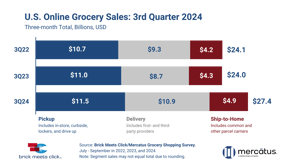RETAILERS FINE-TUNE LOYALTY
Industry statistics show that 75% of U.S households have already signed up for a supermarket loyalty shopping program.With that many programs, it just isn't enough anymore for supermarket retailers to simply have a loyalty program.Retailers and consultants told SN that now the trick is to refine these programs in an effort to make them different and, ultimately, more effective.Beyond that, industry
February 4, 2002
PETER PERROTTA
Industry statistics show that 75% of U.S households have already signed up for a supermarket loyalty shopping program.
With that many programs, it just isn't enough anymore for supermarket retailers to simply have a loyalty program.
Retailers and consultants told SN that now the trick is to refine these programs in an effort to make them different and, ultimately, more effective.
Beyond that, industry observers say, retailers are keeping a keen eye on future technology to make sure they are taking full advantage of all applications and solutions available to boost loyalty and enhance store sales.
Noah Katz, vice president of PSK Supermarkets, a Mount Vernon, N.Y.-based chain of 20 Foodtowns in the New York area, for instance, wasn't happy just resting on the laurels of a successful S&H greenpoints program.
"While our program is very steady, we keep refining it with different banners," Katz told SN.
One refinement Katz's Foodtown uses are frequent cross promotions that are tied in with holidays or big events.
For example, during this past Super Bowl weekend, Katz tied in promotions for a free six-pack of Pepsi, Stouffer's French Bread Pizza, Foodtown Sour Cream, Doritos Tortilla Chips and Old El Paso Salsa.
Loyalty customers were able to pick up any one of these promotional products free by redeeming some of their S&H greenpoints -- 2,000 points for Doritos, pizza or soda, 1,500 for the salsa and 750 for the sour cream.
"Every major holiday or event, we do something like this," Katz said. "It brings home the point that you can use your points for anything: free food, frequent flier miles, a CD player, television."
Additionally, Katz' Foodtown is about to launch an expanded version of its S&H greenpoints program that, according to some marketing consultants, is part of a fast-emerging trend.
This month, the entire Foodtown cooperative -- 60 stores -- will be launching what it is calling its Affinity Merchants Program.
Under this program, Foodtown supermarkets will team up with neighboring merchants -- providing the business is a noncompetitor -- who will also participate in the greenpoints program.
For example, Foodtown customers will be able to use their loyalty cards at a participating dry cleaners or jewelry store to earn points, Katz said.
"If you spend $400 on jewelry, you are going to get 4,000 greenpoints," Katz said.
Katz said these types of "affinity" loyalty programs are definitely a trend of the future.
Glen Hausfater, managing partner of the Chicago-based Partners in Loyalty Marketing, agreed with Katz. "It adds value for the customer outside the store," he said.
Pat Iasillo, director of customer relationship marketing at the seven-store Remke Supermarkets, Covington, Ky., said a trend he sees emerging is the attempt to establish better communication with the customer. "One area we are seeing more of is in sweepstakes or gift giveaways that tie the entries back to the frequent shopper card." Iasillo said his stores are gearing up to do a car giveaway. "The customers can register [for the sweepstakes] each time they shop in the store, or they can buy certain products tied into the promotion," Iasillo said.
Moreover, the move to do more one-to-one marketing is also working its way into retailers' database management programs, Iasillo said.
Iasillo, like other industry observers, said the move to do targeted marketing is directly tied to newer, more sophisticated software capable of identifying customers who are most likely to buy certain promotional items.
Barry Kotek, managing partner, Retail Systems, Naples, Fla., said retailers need to do a better job with their frequent shopper programs, using better analytics and marketing skills to make the most of data collected at the point of sale. Kotek points to wireless promotion and scanning devices as a development that may begin to take hold this year.
Consumers will be able to use these devices to help plan shopping trips, receive special promotions and check out their groceries.
He points to a new technology that allows for a scanner-enabled cell phone to not only scan items in a supermarket but check out grocery orders as well.
Leib Lurie, president of Beeline Shopper, Troy, Ohio, said his company's parent, Air Clic, has teamed up with Symbol Technologies, Motorola and Ericsson to work on this type of cell-phone technology. The cell-phone scanner, called Connect-to-Checkout, is about to be piloted by three major supermarket retailers, Lurie said. He declined to identify them.
Lurie said the cell-phone scanner would be compatible with a product already marketed by Beeline called the home-scanning system. Bashas' Groceries, Chandler, Ariz., has piloted this program.
Consumers scan bar codes of either empty packages or from a book to generate shopping lists. The lists can be downloaded to a computer and printed out.
Lurie said the cell-phone scanner can be used in conjunction with the home scanner. Customers will be able to activate their cell phones to obtain their shopping lists, he explained.
About the Author
You May Also Like




